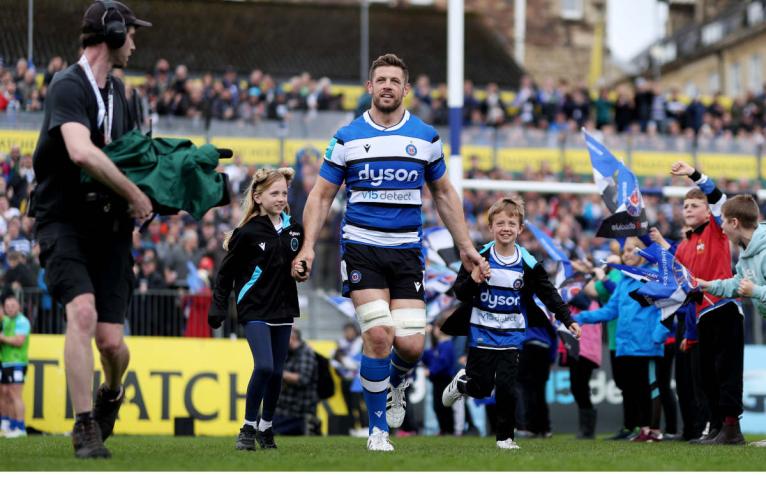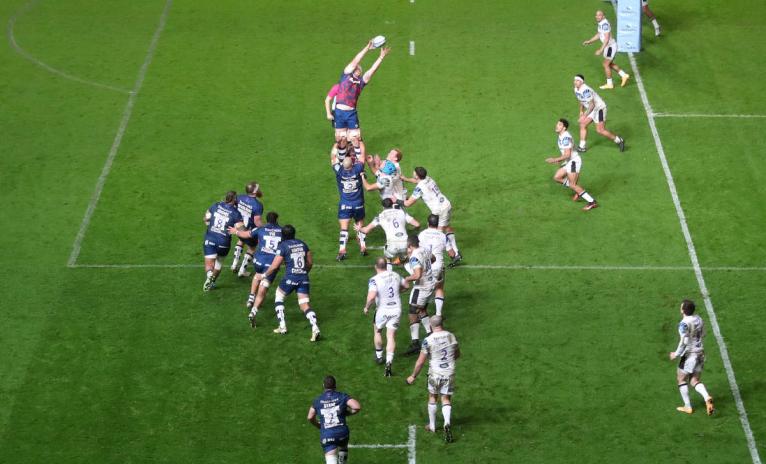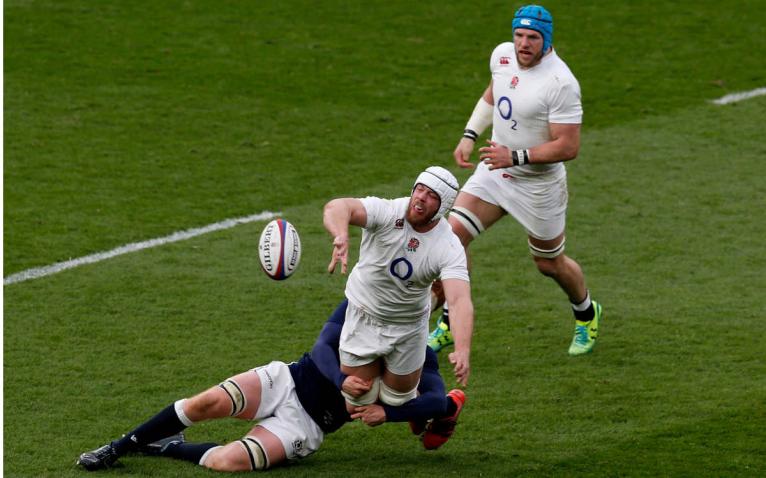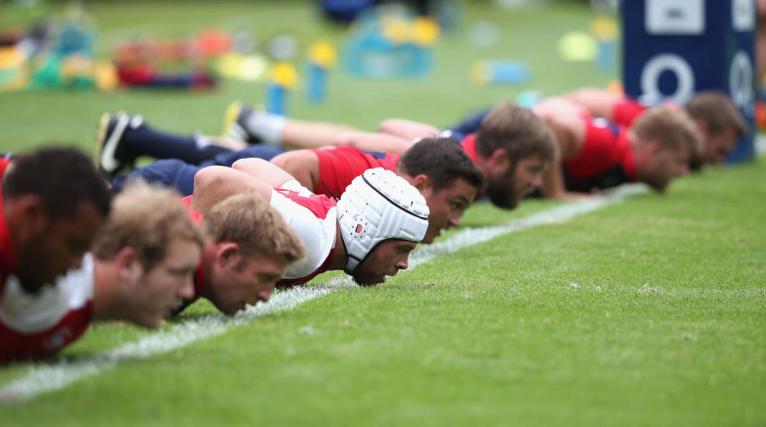Basil the cat is prowling around Dave Attwood, looking incongruously small in his massive hands. No one could ever accuse Attwood himself of being a pussycat, however, and as the former England lock enters into retirement he has some honest words for today’s players: grow up.
Attwood hangs up his boots at a time when he believes English rugby needs to make some bold decisions. Cash is in short supply at the same time that doubts are high. Players, he believes, need to step up to drive initiatives that will help grow the game, both commercially and through the media.
No longer, he believes, can players have the luxury of focusing purely on what’s happening on the field. They must take personal responsibility, along with their clubs and governing bodies, for the vigour and longevity of the game. That means more commercial appearances, more engagement with the science around the game, and more savvy use of social media that will pull in an enlarged fanbase.
“For a long time players haven’t taken a vast amount of responsibility for the health of the game in terms of a responsibility for being aware of the developments around the science of concussion and around the financial implications of what we do and the building of commercial relationships,” he says, fresh from a spot of sanding at the latest property he is redeveloping in Bath. “Rugby isn’t in the position of football where a footballer can do an appearance and clubs don’t have to do anything else to encourage sponsors to be involved. Rugby’s not as fortunate, healthy or financially sound as that, and players need to take more responsibility in terms of building, growing, nurturing and maintaining relationships with corporate partners. That also connects with building sustainable club cultures and helping to build better people involved in the game. That’s very much an area I want to explore.”
Attwood, whose 18-year career took him zipping along all three sides of the traditional West Country rugby triangle of Bath, Gloucester and Bristol, wants to see compulsory weekly sessions introduced to support players’ personal, mental and corporate development.

“We need to be better at utilising the tools in the toolbox that connect us with the public,” he says. “It may be that someone who never uses social media needs to learn how to use it. That’s not what they came to their club to do, they went there to play rugby. But if they point-blank say they’re not going to do it they’re not helping the game to grow, they’re not helping themselves.”
What would Attwood say to a 20-year-old who says they only want to play rugby? “In short, grow up. We are desperately privileged to do what we do and I’ve been blessed to have been able to do it for almost two decades. If we don’t take responsibility – if we don’t offer more than nothing – then the game that brings so many smiles across the planet could die. We need to take a bit of responsibility to sustain it.
“No one’s expecting a 20-year-old to immediately be a schmoozer like (former Bath team mates) Lee Mears or Francois Louw. But the ability to do that is something that needs to grow as your skills, strength and speed grow. That’s a growing up process that needs to happen not just on the part of the player but across the whole sport.
There is growth needed in far more areas than just the physical attributes of delivery on the rugby field. It’s not enough to just say you are focused on being the best rugby player you can be, because ultimately you could be Dan Carter but, if the game is dying, who cares?
“There is growth needed in far more areas than just the physical attributes of delivery on the rugby field. It’s not enough to just say you are focused on being the best rugby player you can be, because ultimately you could be Dan Carter but, if the game is dying, who cares? We can do more to draw viewers, spectators and friends into the game. More viewers means more revenue, more revenue means better competition, means higher wages. Everyone benefits in the long term.”
Time is something that Attwood now has distinctly more of. His final game at The Recreation Ground on May 6 was as close as most players get to a fairytale ending. After coming off the bench, Attwood delivered a typically muscular display to help swing the battle for the final European Champions Cup place in Bath’s favour. An emotional farewell lap followed, with the 36-year-old clearly savouring every second through a few deep gulps.
His final week as a professional player was one of revelling in moments and rituals that had become staples of his life for almost two decades, but which he knew he would never taste again: soaking up the sensation of his final scrum session; putting 250 kilos on the bar for leg squats that he will never again be required to smash out in anger. “There was a part of me that wasn’t just lifting the weights but trying to absorb the experience, thinking about how it physically felt and almost taking a mental picture,” he says, almost wistfully. “Because there will be no need to do this again.”

Still, Attwood is grateful to be giving his body – all 6ft 7ins of it – a breather. It was, after all, one of the more dominant, irresistible frames to be careering around European rugby fields for well over a decade.
“Tom Dunn and I were reflecting the other day on being sore for a decade,” he says. “It’s not so much that your body recovers, your body gets numb to the pain. I’m hoping in the not too distant future there’s a phase when things stop getting sore and I’ll be able to move my shoulders in a way I haven’t been able to do for a while. Hopefully my body will be thanking me soon.”
Attwood, whose 24 England caps are by many people’s reckoning a dubiously low reward for his physical talents, has been one of the Premiership’s most thoughtful interviews for some time. With his degree in physics and philosophy, and more recently law, and his work as player rep for the Rugby Players’ Association , he has always been able to offer clear-sighted – and sometimes contrarian – perspectives. This intellectual ability and flair for communication has been harnessed by coaches, especially in his latter years as a player.
“There is Dave the man and Dave the player,” says Johann van Graan, Bath’s head of rugby. “Firstly, the man. A phenomenal human being. The influence that he’s had at this club – at other clubs too – is on those around him. He’s someone who really cares and goes out of his way to make it special for others. And then Dave the rugby player. He’s been part of some very good sides that I coached against – England and Toulon. We signed him here at Bath at the start of the season from an experience, a leadership and a club perspective and we spoke about connection, clarity and commitment and those are all things that you get with Dave.”
Rugby is such a fantastic game for so many reasons, and the game helps to shape and mould people. We don’t try and amplify and increase the camaraderie, the teamwork and the benevolence: put simply, the art of being a good bloke.
Attwood the man is immediately throwing himself out of his comfort zone in retirement. On July 19 he will be raising money for Aspire, a charity supporting people paralysed by spinal cord injury, by taking part in a three-man relay swim across the Channel. Speedos and a swimming hat will replace his trademark white scrum cap.
But he wants to remain connected with rugby, not least to support players in the way that van Graan highlights.
“I want to be in and among players at a club on a daily basis, helping to grow culture and development: assisting with RFU disciplinaries, helping with the development of rules of the game, highlighting protection around player welfare,” says Attwood. “Rugby is such a fantastic game for so many reasons, and the game helps to shape and mould people. There are positives and negatives about that. Sometimes we focus on getting rid of the negatives – the drinking culture and the misogynistic lad culture that can come with it – and we don’t try and amplify and increase the camaraderie, the teamwork and the benevolence: put simply, the art of being a good bloke.”

Attwood has put his own money and time into supporting research into concussion and brain degeneration generally, and one area he is passionate about influencing is the framework around dangerous and reckless play. He remains sceptical about the rush to change the game’s rules in the name of player protection, believing that more independent peer-reviewed research is needed to understand the nature of head impacts.
“There are a lot of rules being trialled to protect people and there’s not enough understanding of what the protection actually looks like,” he argues. “I would rather see more research into the impact of the effects of head contacts. For me, it’s not as simple as saying: head contact – dangerous. We don’t really know with any degree of certainty any of the real impact in terms of cognitive function of head contact. Until we get a better picture then it’s not really fair to make too many rule changes and disrupt the game potentially for the worse.
“I don’t think it’s necessarily fair to say the research that’s being done is being done too late. Yes, it’s too late in the sense that nothing has ever been done in time. If there is a problem you can always say, ‘Well, if we’d done this beforehand…’. Sure, but we didn’t realise how big the problem was, otherwise we’d have done it beforehand.”
I’ve got a photo of me taken after a fitness test, moments after that I’d had the ‘thanks but you’re going home and on standby’ conversation. I thought to myself: there’s nothing more you could have done here to change opinions. It was a measuring stick moment
Growth in its many aspects is what Attwood wants. Individual growth in himself and the athletes he has worked alongside; growth in understanding the science behind the game; and growth to preserve the game he clearly loves.
As our interview nears its end, Attwood confides how his own story of growth goes back eight years. The setting is the side of the training pitch at England’s Pennyhill Park training base, and an exhausted Attwood has just been told he’s one of the final players to be cut before the 2015 World Cup.
“I’ve got a photo of me taken after a fitness test, and moments after that I’d had the ‘thanks but you’re going home and on standby’ conversation. I remember dripping with sweat and sitting next to the (Getty) photographer Dave Rogers as he was captioning the photo. I thought to myself: there’s nothing more you could have done here to change opinions or get stronger or fitter. It was a measuring stick moment.

“There was a sense of clarity and, oddly, not a sense of disappointment because I felt, at the time, I’d given everything I possibly could have to be in that room and it wasn’t enough. In the years after that I think I became a better player. And that’s partly because of the acknowledgment that I’d exhausted all the avenues I was aware of and that I had to look elsewhere.”
Looking elsewhere took Attwood up the hill from The Rec to the University of Bath where he began personal speed sessions with Olympic gold medal-winning sprinter Jason Gardener.
“I’m 120kg,” smiles Attwood. “I’m designed for running into things. I’d never spent any time with a sprint coach one-to-one. But a couple of times a week I was with Jason working on acceleration, running mechanics, conservation of energy, and suddenly I had room for growth in my game which was hitherto unknown to me. If I’d come across that earlier on in my career, I wonder whether that might have given me the edge, but if I hadn’t reached a point where I felt I’d exhausted the avenues I had I wouldn’t really have paid the idea much heed. I needed to reach that pinnacle of effort and come up short to be able to continue to grow.”
Retired, yes. But in Dave Attwood you sense a man who still sees growth ahead, both for himself and others.
To support Dave Attwood’s fundraising Channel swim for Aspire spinal cord charity, visit his JustGiving page: https://www.justgiving.com/fundraising/daveattwoodchannelgators?


Comments
Join free and tell us what you really think!
Sign up for free